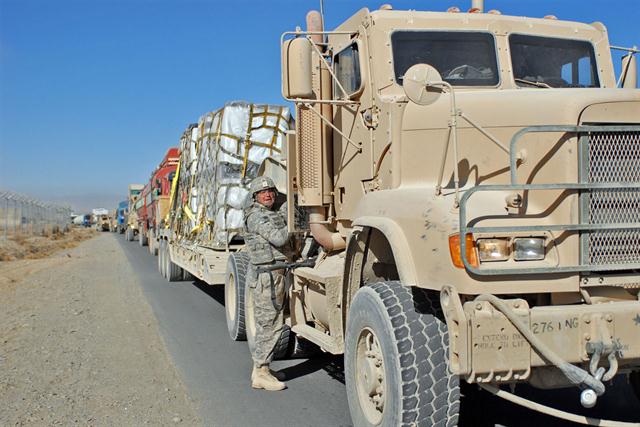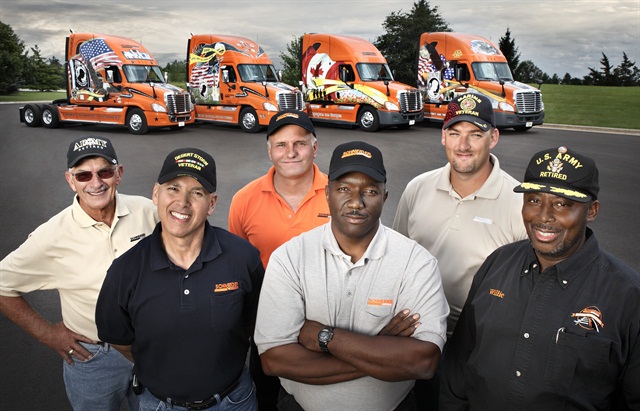A recent article by Oliver Patton of Truckinginfo.com states that many states have eased CDL restrictions for military drivers, with the two-fold benefit of helping veterans get jobs and alleviating the driver shortage. Great news for our unemployed veterans.
 |
In the past two years, 34 states have adopted laws that allow motor vehicle departments to waive the CDL skills test for qualified military veterans, the Obama administration says in a new report.
Nine more states plus the District of Columbia are considering legislation to do the same thing. And under a new law, states may issue commercial licenses to military personnel who live in another state.
These are among several initiatives currently under way that could help relieve a driver shortage in the truckload industry that apparently is growing worse.
“The truckload industry has long suffered from a driver shortage. However, its severity level is now acute,” says John Larkin of the Stifel Transportation & Logistics Research Group in a recent report.
Larkin, citing an analysis by Gordon Klemp, president of the National Transportation Institute, says the problem is partly demographic: Only 17% of drivers and owner-operators are 34 years old or younger.
Economic conditions conspire to make the matter worse, with the growing strength of the construction sector siphoning away would-be drivers, he says.
And while some owner-operators are seeing mileage-rate increases, pay for company drivers appears likely to remain where it is.
Military drivers could help lessen the painAccording to the White House report, “The Fast Track to Civilian Employment,” there are more than 22,000 active-duty drivers in the military and nearly 10,000 became civilians last year.
Military service can instill skills that are desirable for truck drivers, discipline not the least of them, but clearly not all of those driving specialists are interested in commercial trucking.
There are no exact numbers on how many do want to work for a fleet or own their own truck, so it’s hard to say how big a dent these veterans can put in the shortage of drivers, says Boyd Stephenson, director of hazmat and licensing policy at the American Trucking Associations.
And the hands-on driving skills that service members learn do not necessarily transfer directly to civilian trucking. The military, for example, does not train to Federal Motor Carrier Safety Administration regulations, Stephenson says.
Nor are military drivers exposed to commercial-style equipment, according to Cindy Atwood, deputy director of the Commercial Vehicle Training Association, which represents private truck driver training schools.
“You can’t take someone directly out of the military and put him in an 18-wheeler,” she says. “About 80% of commercial trucks have manual transmissions, while 98% of military trucks have automatics.”
And more than 95% of military trucks qualify only as Class B trucks, Stephen-son notes.
All of that said, the federal-state effort to ease the path between military and commercial trucking is useful, he says. The skills test waiver, for example, makes it possible for a safe military driver who meets several conditions to skip the CDL driving test.
Stephenson also underscores the usefulness of allowing states to exempt military personnel from restrictions on issuing a CDL to someone whose legal residence is in another state.
Procedures for this exemption may vary from state to state, but the overall effect will be to make CDLs more accessible to military drivers, the White House report says.
The report also touches on what Stephenson describes as the most effective initiative of all, Virginia’s Troops to Trucks Program.
The partnership links military bases such as the Marine Corps’ Quan-tico and the Army’s Fort Lee with local community colleges, the Virginia Department of Motor Vehicles and the Virginia Trucking Association. The DMV supplies a mobile CDL unit and the trucking association supplies tractor-trailers that visit the bases so military drivers can get experience on Class A equipment. This, Stephenson says, makes the skills test waiver more useful.
“Those guys and girls are going to end up getting Class A CDLs, which makes them far more employable than someone with a Class B license.”
Go to www.TADPGS.com, click on the “Looking for People” tab, then view “Veterans Solutions” to see more for information on our Veterans Solutions for Employers. Please feel free to join our LinkedIn group, Veterans Hiring Solutions for Veterans and Companies at http://linkd.in/Sg346w. If you have specific questions about hiring veterans or the incentives for doing so, contact me at Ben.Marich@Adeccona.com.


